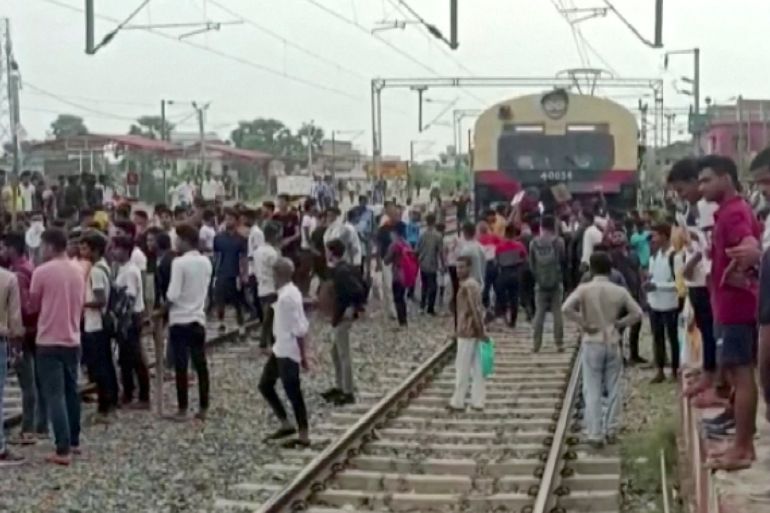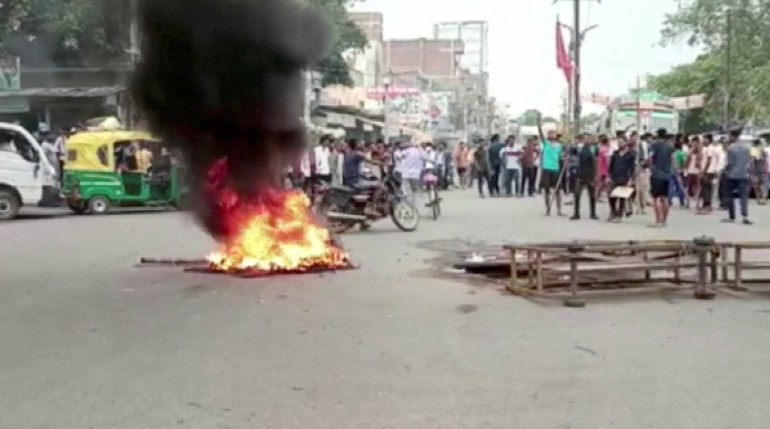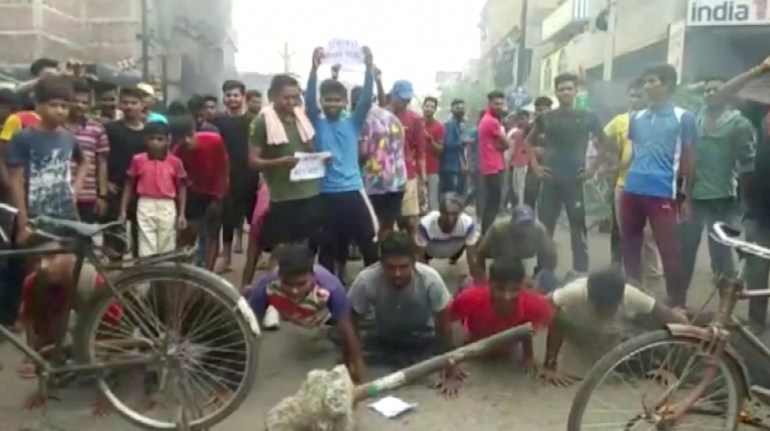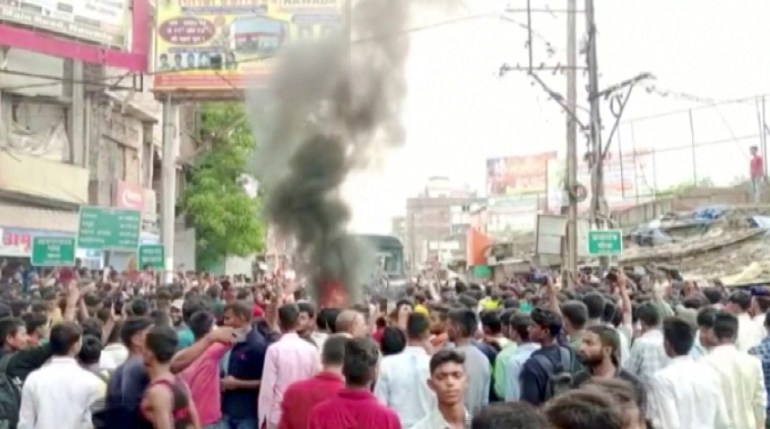‘Agnipath’: Anger in India over Modi’s new army recruitment plan
Protesters set BJP office on fire and block railway tracks and roads in demonstrations against a new job scheme in the military.

Angry crowds in India set an office of the country’s ruling party on fire, attacked railway infrastructure and blocked roads in widening protests against a new military recruitment system, police officials said.
Prime Minister Narendra Modi’s government on Tuesday announced an overhaul of recruitment for India’s 1.38 million-strong armed forces, looking to bring down the average age of personnel and reduce pension expenditure.
Keep reading
list of 4 itemsCOVID-battered Indian migrant workers prefer jobs closer to home
With no jobs, millions of Indians are exiting the labour force
Long after lockdowns, India’s youth still struggle to find work
But potential recruits, military veterans, opposition leaders and even some members of Modi’s ruling Bharatiya Janata Party (BJP) have raised reservations over the revamped process.
In eastern India’s Bihar state, where protests flared in around a dozen locations, thousands gathered in Nawada district to demonstrate against the new recruitment system, police official Gaurav Mangla said on Thursday.
“They torched a BJP office, torched tyres in three prominent areas of the city, damaged a bus and many private vehicles,” Mangla told the Reuters news agency.
Protesters also attacked railway property across Bihar, settling alight coaches in at least two locations, damaging train tracks and vandalising a station, according to officials and a railways statement.
Smoke billowed from burning tyres at a crossroads in Jehanabad where protesters shouted slogans and performed push-ups to emphasise their fitness for the service.

Police said protests also took place in northern Haryana state and western Rajasthan – both traditional recruiting areas for the Indian military – and in various districts of Uttar Pradesh, India’s most populous state.
In January this year, Bihar and Uttar Pradesh saw huge protests over the recruitment process for railway jobs underlining India’s persistent unemployment problem.
‘Where will we go after 4 years?’
The new system, called “Agnipath”, meaning “path of fire” in Hindi, will bring in men and women between the ages of 17-and-a-half and 21 for a four-year tenure, with only a quarter retained for longer periods.
Previously, soldiers have been recruited by the army, navy and air force separately and typically enter service for up to 17 years for the lowest ranks.
The shorter tenure has caused concern among potential recruits and security analysts.
“Where will we go after working for only four years?” said a young man, surrounded by fellow protesters in Bihar’s Jehanabad district. “We will be homeless after four years of service. So we have jammed the roads.”

In a letter to India’s defence minister Rajnath Singh on Thursday, Varun Gandhi, a BJP member of parliament from Uttar Pradesh, said 75 percent of those recruited under the scheme would become unemployed after four years of service.
“Every year, this number will increase,” Gandhi said, according to a copy of the letter posted by him on social media.
“When India faces threats on two fronts, the uncalled for Agnipath scheme reduces the operational effectiveness of our armed forces,” Rahul Gandhi, the leader of the main opposition party Congress, said in a tweet.
“The BJP govt must stop compromising the dignity, traditions, valour and discipline of our forces.”

In an article for Al Jazeera on Thursday, analyst Sushant Singh said the new army recruitment plan was announced without any discussion in parliament and could have “devastating consequences”.
“More than half of the Indian government’s defence expenditure of $70.6bn goes towards pensions and salaries for Indian military personnel. It was shooting upwards by the year and Modi’s government was unable to initiate a substantive reform within the existing structure,” Singh wrote.
“So the Indian government on Tuesday decided to demolish the structure itself.”
According to Singh, the military proposal will also have a direct bearing on the Indian society, which has seen a spike in hate speech and attacks on Muslims and other minorities by India’s right-wing Hindu groups since Modi came to power in 2014.
“Research shows that the most violent ethnic cleansing occurred when members of the majority community gained combat experience as soldiers while the minority community was unorganised,” wrote Singh.